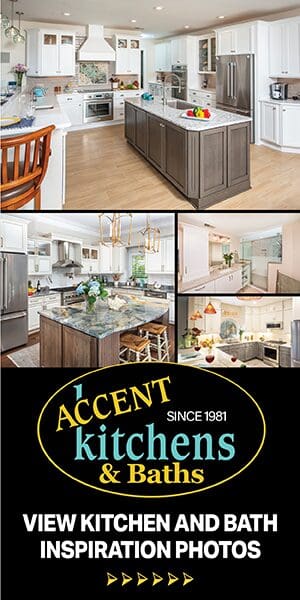For homeowners along Virginia’s shoreline, beauty is only part of the equation. Living by the water offers incredible views and a relaxed lifestyle, but it also brings unique challenges: salt spray, high humidity, heavy storms, and, increasingly, the risk of flooding. It’s no wonder that Zillow reports 86% of buyers now say it’s essential for a home to have at least one climate-resilient feature.
Coastal living demands more than charm—it requires durability. Today’s homeowners are investing in smart materials and upgrades that withstand harsh conditions, reduce maintenance, and preserve long-term value.

Built for the Water’s Edge
Water is relentless, especially saltwater. Traditional wood and untreated metals break down quickly in coastal environments, leaving homeowners with costly repairs. Marine-grade composites, stone, and stainless steel are designed to handle submersion, humidity, and salt without losing integrity.
This matters not just for decks and docks, but for fences, trim, and even outdoor furniture. Choosing water-resistant options ensures that a home remains functional and attractive, even after seasons of exposure.
Weather-Resistant Materials: Standing Strong Against Storms
Hurricane season brings high winds, driving rain, and debris that can challenge any structure. Materials engineered to resist fading, scratching, and warping give homeowners peace of mind when storms roll through. Engineered siding and roofing products, for example, offer strength without sacrificing curb appeal.
The added benefit? Less ongoing maintenance. Instead of constant repainting, sealing, or replacing, resilient materials hold their look for years, saving time and money in the long run.

Staying Cool in the Coastal Heat
Coastal Virginia summers can be sweltering. Without the right materials, decks, patios, and walkways quickly become unwalkable under bare feet. Heat-mitigating products now make outdoor living far more comfortable by reflecting solar energy and reducing surface temperatures.
Cooler outdoor surfaces also benefit the home itself. By lowering heat absorption, these materials can contribute to lower cooling costs and a more comfortable indoor environment. For homeowners who spend summer evenings outside, it’s a small detail that makes a big difference.
Fire-Smart Choices in a Changing Climate
Though hurricanes often dominate coastal concerns, fire resistance should not be overlooked. Materials that meet wildfire urban interface (WUI) standards add a layer of safety to homes in wooded or brush-prone areas near the coast. Fire-resistant decking, siding, and roofing help reduce risks while still delivering visual appeal.
Sustainable by Design: Protecting the Place You Love
For many who live by the water, environmental responsibility is part of the lifestyle. Choosing materials made from recycled content or renewable resources allows homeowners to reduce their footprint while protecting the landscapes they treasure.
Composite decking is a prime example—many products today are produced from recycled plastic and reclaimed wood, turning waste into long-lasting outdoor living spaces. It’s an investment that feels as good as it looks.

A Real-World Example
Trex, a manufacturer of composite decking, has designed products specifically to handle coastal challenges. Their decking is saltwater-safe, fully submersible, and engineered to resist fading and heat absorption. It also meets fire-safety standards and is sustainably manufactured from recycled materials. While Trex is just one option among many, it demonstrates the level of innovation available to today’s homeowners.
The Future of Coastal Curb Appeal
Curb appeal is more than a fresh coat of paint or a manicured lawn. In Coastal Virginia, it’s about creating a home that looks beautiful while standing strong against the elements. By investing in water-resistant materials, heat-smart technologies, and eco-friendly choices, homeowners can enjoy outdoor spaces that last—and buyers will continue to prioritize these features when making purchasing decisions.The takeaway: For coastal homeowners, climate resilience is no longer optional. It’s a defining feature of smart design. Durable, sustainable upgrades not only protect your investment but also ensure your home remains a source of pride and comfort in the face of changing conditions.




















